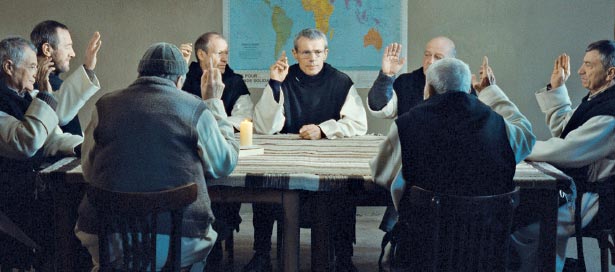Heroes vs. Saints
The Power of Storytelling in a Combative World
By Jeffrey Overstreet (jeffreyo@spu.edu) | Photo Courtesy of Sony Pictures Entertainment
 To flee the Algerian civil war or stay and serve the poor? Trappist monks debate what to do in Of Gods and Men. Read about more films with saint-like characters.
To flee the Algerian civil war or stay and serve the poor? Trappist monks debate what to do in Of Gods and Men. Read about more films with saint-like characters.
Have you noticed that almost every human activity has become a televised competition?
Yesterday's musical variety shows are now contests that invite us to vote for American idols. Yesterday's cooking program is now a contentious sport, as cooks are crowned winners or berated as losers. Entrepreneurs are exalted or disgraced. Resourcefulness is second to cutthroat, self-serving tactics on Survivor. Need I mention The Bachelor?
No wonder elections bring out the basest behavior in politicians and pundits. No wonder the networks present prime-time sports (which are competitive by nature) as if they're something fiercer — actual battles driven by grudges and rivalries instead of athleticism.
The Avengers, Skyfall, Spider-Man — salvation comes when armed heroes vanquish monstrous villains in seven of the top 10 box office hits in the past year. Due to concerns about cultural sensitivity, America's enthusiasm for “cowboys versus Indians” stories (and, more recently, stories of Americans versus Middle Eastern bad guys) has declined. It's perceived as inappropriate to affirm demeaning cultural generalizations. But instead of questioning that “showdown impulse,” Hollywood now invents enemies so we can destroy them with impunity — thus, the proliferation of movies about vampires, alien invaders, and zombie hordes. (Film critic Anthony Lane wryly observed that it is apparently “not possible to commit atrocities against extraterrestrials.”)
An interesting exception, The Hunger Games dares to ask if its central characters, caught in a
death match, are being exploited by the viewing audience that put them there. Is this Roman coliseum bloodshed as corporate entertainment? It doesn’t have to be this way.
When I think about the stories that stay with me from childhood, few are about heroes vanquishing villains. Where the Wild Things Are and Corduroy follow characters who respond to brokenness and anxiety in misguided ways. They find grace anyway — whether it's in the form of a hot supper waiting when they come home, or a new home altogether.
Some stories find redemption, rather than obliteration, for wretched villains. The title character in How the Grinch Stole Christmas is transformed, not destroyed. He's a beast redeemed by beauty — the forgiveness and generosity of neighbors. Luke Skywalker set down his lightsaber to reach out his hand in invitation, giving the Star Wars galaxy's worst villain a chance for reconciliation. The Lord of the Rings endorsed the heroism of showing mercy to a wretched monster. Stories like these made me hope for richer conclusions than “us-versus-them” smackdowns.
The ethicist Samuel Wells writes that hero stories “are told to laud the virtues of the heroes — for if the hero failed, all would be lost. By contrast, a saint can fail in a way that the hero can’t, because the failure of the saint reveals the forgiveness and the new possibilities made in God, and the saint is just a small character in a story that’s always fundamentally about God.”
If Christ calls us to love our enemies, shouldn’t we see storytelling as an opportunity to practice this?
Instead, some popular “Christian movies” make faith look like a way to win football hampionships.
They make prayer look like a method for wish-ful"llment. Unbelievers are reduced to stock villains. This perpetuates the divisive, misleading message that Christians are “the good guys.”
My favorite recent big-screen portrayal of Christ-like cultural engagement is a film called Of Gods and Men. In Xavier Beauvois’ film, humble French monks in Algeria refuse to leave their monastery, ministering to needy Muslim neighbors while violent extremists threaten them with death. Their answer to aggression is a sobering, but beautiful, testimony.
If we're to engage a troubled culture, perhaps we should share stories in which we see contentiousness defused by compassion, and glory achieved not by Herculean heroes but by God and his humble, broken saints.
“When God wants to change the world,” writes N.T. Wright, “he doesn't send in the tanks. He sends in the meek, the mourners, those who are hungry and thirsty for God's justice, the peacemakers.”
Read about more films with saint-like characters in Response Onscreen.
 Jeffrey Overstreet is a contributing editor for Response magazine and communications specialist in the SPU Office of University Communications. He presented a session on this topic at SPU's 2012 Day of Common Learning.
Jeffrey Overstreet is a contributing editor for Response magazine and communications specialist in the SPU Office of University Communications. He presented a session on this topic at SPU's 2012 Day of Common Learning.
